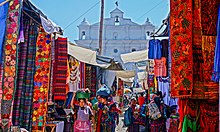Chichicastenango, El Quiché
Chichicastenango is a K'iche' Maya cultural centre. According to the 2012 census, 98.5% of the municipality's population is indigenous Mayan K'iche. Of the population, 21% speak only K'iche, 71% speak both K'iche and Spanish, and the remaining 8% speak only Spanish.
Market

Chichicastenango hosts market days on Thursdays and Sundays where vendors sell handicrafts, food, flowers, pottery, wooden boxes, condiments, medicinal plants, candles, pom and copal (traditional incense), cal (lime stones for preparing tortillas), grindstones, pigs and chickens, machetes, and other tools.
Among the items sold are textiles, particularly women's blouses. Masks used by dancers in traditional dances, such as the Dance of the Conquest, are also manufactured in Chichicastenango.
Church of Santo Tomás
Next to the market is the 400-year-old church of Santo Tomás. It is built atop a Pre-Columbian temple platform, and the steps originally leading to a temple of the pre-Hispanic Maya civilization remain venerated. K'iche' Maya priests still use the church for their rituals, burning incense and candles. In special cases, they burn a chicken for the gods. Each of the 20 stairs that lead up to the church stands for one month of the Maya calendar year. Another key element of Chichicastenango is the Cofradia of Pascual Abaj, which is an ancient carved stone venerated nearby and the Maya priests perform several rituals there. Writing on the stone records the doings of a king named Tohil (Fate).
The Chichicastenango Regional Museum lies in its grounds.
In music
At least three songs have been written about the town.
- “Chichicastenango” Xavier Cugat 1937
- "In Chi-Chi Castenango" Edmundo Ros Mambo Jambo: Original Recordings 1941-1950
- "In the Land of The Maya" Lennie Gallant In the Land of The Maya
In addition, the character Rosie from Bye Bye Birdie sings sarcastically of being the toast of Chichicastenango.
Geography
Chichicastenango is composed of the municipal seat and 81 rural communities. Nearby village communities include Paquixic (1.0 nm), Chucam (1.0 nm), Chujupen (1.4 nm), Camanibal (2.2 nm), Chontala (2.2 nm) and Chucojom (1.0 nm).
In films
The New Adventures of Tarzan (1935)
In 1935, the film The New Adventures of Tarzan, was filmed on location in Guatemala, taking advantage of the help from the United Fruit Company and president Jorge Ubico. Chichicastenango was among the locations used during filming.
Sacred City of the Mayans (1936)
This 8-minute color travelogue devoted to Chichicastenango is one of James A. Fitzpatrick's TravelTalks. It is occasionally shown on Turner Classic Movies as a filler between feature films.
See also
References
- ^ "Chichicastenango | Nutri-Salud Guatemala". Archived from the original on 2014-11-06. Retrieved 2014-11-06.
- ^ Citypopulation.de Population of departments and municipalities in Guatemala
- ^ Citypopulation.de Population of cities & towns in Guatemala
- ^ "Chichicastenango, Quiché". Ojoconmipisto.com. 11 October 2013. Retrieved 12 October 2017.
- ^ Epigraphic Society Occasional Publications, Vol. 17, 1988 A Decipherment of the Chichicastenango Stone (22 pp) John S. Carroll -p 31
- ^ "Santo Tomás Chichicastenango - Plan de Desarrollo Municipal" (PDF). Municipalidad de Chichicastenango. 2002. Retrieved 1 August 2008.
- ^ SEGEPLAN. "Municipios de Quiché, Guatemala". Secretaría General de Planificación y Programación de la Presidencia de la República. Guatemala. Archived from the original on 2 July 2015. Retrieved 30 June 2015.
- ^ Barillas, Edgar (2013). "50 películas filmadas en Guatemala y una que no (1935-1996). Apuntes para una cartografía de los lugares filmados en Guatemala". Revista Historia de la Universidad de San Carlos de Guatemala (in Spanish). Guatemala. Archived from the original on October 22, 2015. Retrieved 22 October 2015.
